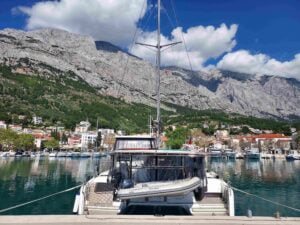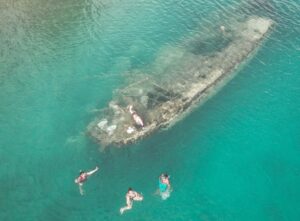When travelling along the east coast of Scotland, you can’t deny the difference in prosperity. Difference in poor and rich people.
We notice at the entrance of the supermarket, special big bins where you can put packaged food that you bring from home which you don’t use of that will expire soon. Those bins are well-stocked and the food donations will be given to the Foodbank for people in need in the local community.
We also heard about the high prices for electricity and gas in Scotland (like in Holland). So it is a saying now in Scotland that some households or senior citizens have to choose: eat or heat. Which sounds like a terrible choice to make and incredible in 2021!
We have visited fish villages which use to be prosperous small towns with sometimes hundreds of boats in the harbor that sailed out every day to the North Sea to catch herring, mackerel, haddock, lobster, kingcrab or salmon, depending on the season. Sometimes there were 30.000 lobsterpots in front of the coastline. Due to industrialization, big ships were developed, owned by large (foreign) companies which could catch fish in much larger quantities in less time and also process the fish much cheaper and faster. So many private fishboats and small companies went bankrupted and complete villages turned poor. You can still see it in their houses and appearance in the street.
It’s not by accident that the most notorious prison in Scotland was established here at the east coast, in the city of Peterhead. This maximum secured prison for male captives, housed over 400 of the most dangerous criminals in the country. We booked a tour through the prison which was active for 125 years from 1888 to 2013. So it hasn’t been closed for that long!
In this prison there were murders among prisoners, because gangs from even poorer Glasgow attacked each other in prison. Riots took place where guards were made hostage and brought up the roof of the prison blindfolded by the rioters. How scared these guards must have been! Walking through the prison you see the sober cells of prisoners, the kitchen, outside gym, infirmary and on your audio-set you would hear the stories of prisoners and guards, about spectacular escapes and the turbulent history of the prison. Really impressive, also to stand in the ‘Silent Cell’ where some prisoners were kept in solitary confinement in the dark.
The prison is called ‘Peterhead Convict Prison’, meaning the prisoners had to do forced labor in the period from 1888 to 1957: for 5 days a week from 6.00h am to 5.00h pm they worked in a mine chopping granite blocks which were used to expand the harbor quays of Peterhead for commercial big sail boats. It was the only hard labor work prison in Scotland. So that was the whole idea of having a prison in Peterhead: the inmates where used as hard work employees for the harbor. Once the harbor expansion was ready in 1957, the forced labor stopped and ‘Scotlands Toughest prison’ still remained active till 2013.
The Rich side of Scotland we have also noticed. Cycling through the towns and cities here, you also see many beautiful castles and country houses with stables and expensive cars. For example Dunnottar Castle, build on a spectacular spot on a cliff top near Stonehaven.
The castle is over 1000 years old and now a ruin, but once was home to the Earls Marischal, one of the most powerful families in Scotland. The earl had a lot of staff working for him. The castle had it’s own brewery, stables, blacksmith, 2 kitchens and even a lion den where the Earl kept a lion as a symbol of power and wealth. But the lion’s roaring at night kept the countess from sleeping, so the lion had to go. Dunnottar castle was visited by famous people like Mary Queen of Scots, Prince Charles and ‘Braveheart’ William Wallace, who by the way destroyed parts of the original castle. Dunnottar is best known as the place where the Scottish crown jewels were hidden from Oliver Cromwell’s invading army in the 17th century. And although the Earl was very rich and powerful, also he experienced the poor life. He forfeited his title by taking part in the Jacobite rebellion of 1715. All his possessions, including the castle, were taken from him by the government.
Whoever we meet, poor or rich or not, our experience with the Scots is very positive: friendly, relaxed and noting is too much trouble to help you!










